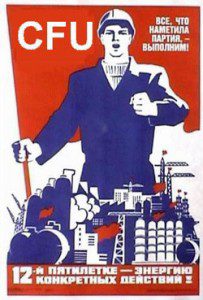If You Build It, Will They Come?
The fledgling Canadian Freelancers Union asks independent writers to join together and improve their financial lot. It's a noble ideal, but whether it's achievable is an open question
 Thank God for the union! These stalwart guardians of labour rights are often the only defense against The Man and his ruthless march towards higher profit and increased shareholder value. While it’s hard to imagine Canadian journalists as soot-stained workers streaming out of a coal mine or steel mill, they still have to deal with the harsh reality of reduced staff sizes and drastic cuts to salaries and full-time positions. “We’ve certainly had concerns about the massive reductions in newsrooms across the country over the past few years,” says Peter Murdoch, vice president of the Communications, Energy and Paperworkers Union of Canada (CEP), which represents over 25,000 people working in the nation’s media. “They’ve put a lot of people in the unemployment line, and sent a lot of people scrambling for freelance work.”
Thank God for the union! These stalwart guardians of labour rights are often the only defense against The Man and his ruthless march towards higher profit and increased shareholder value. While it’s hard to imagine Canadian journalists as soot-stained workers streaming out of a coal mine or steel mill, they still have to deal with the harsh reality of reduced staff sizes and drastic cuts to salaries and full-time positions. “We’ve certainly had concerns about the massive reductions in newsrooms across the country over the past few years,” says Peter Murdoch, vice president of the Communications, Energy and Paperworkers Union of Canada (CEP), which represents over 25,000 people working in the nation’s media. “They’ve put a lot of people in the unemployment line, and sent a lot of people scrambling for freelance work.”
Corporate downsizings in other sectors usually result in a wave of contractors picking up the slack, with commensurate financial rewards for those contractors. Not so in Canadian journalism, especially in the magazine medium: freelance rates, which can average a dollar a word or less for writers regardless of their seniority, haven’t changed in decades. Couple this with a lack of job security and benefits, and it’s obvious that it’s not a Golden Age of opportunity for your typical freelance journalist.
It could be a function of modern labour economics: freelancers have always been a disparate and disorganized group, “literally thousands,” as Murdoch says, “working out of their kitchens and basements.” As such, media organizations have been able to keep rates low simply because they can. But the days of subterranean servitude may be numbered: in May 2004, the CEP voted to create the Canadian Freelance Union (CFU), a body intended to act as a cohesive bargaining unit that will defend the interests of freelance writers and journalists. “We see the way actors, directors, songwriters, even fishermen, have founded unions that help them with collective bargaining,” says Murdoch. “I see no reason why freelance writers shouldn’t have the same benefits.”
It’s unclear if a group as laissez-faire as freelancers can coalesce into a unified voice that speaks for the trade. If they can, it may bring much-needed stability to the freelance world. But it could also bring added instability to the Canadian publishing industry.
• • •
Ironically, the impetus for the CFU arose from the previously adversarial relationship between the union and freelancers. The policy of unions usually emphasized securing full-time positions, while companies tried to contract freelancers to get around hiring permanent staff. “We’ve always had a complex relationship,” says Gary Engler, union steward for the CEP and grassroots organizer for the nascent CFU. “During contract negotiations, we usually include language to make it tough for companies to use freelancers.” But it soon became clear that the relationship had negative implications for both sides. “Freelancers started perceiving the union as the enemy,” Engler says.
The strike at the Calgary Herald in 1999 was seminal in changing union attitudes towards freelancers – at first, for the worse. Freelancers, hired as scab labour by management, crossed picket lines and helped the then Conrad Black?owned Herald to crush the union. “The strike caused the CEP to self-reflect,” Engler recounts. “Did the union do anything to turn freelancers off of us? The answer, clearly, was yes. We could have been much more inclusive.”
Three years ago, the CEP examined the possibility of changing its policy. Instead of viewing freelancers as opponents hired to undercut union aims, Murdoch and Engler starting talking to them and fostering a more cooperative environment. “We had two goals,” recalls Engler. “One, to convince existing union members to include freelancers, and two, to convince freelancers that there’s something in it for them to belong to the union.” The logic was simple: united, we are stronger.
Beyond the mechanics of setting up a union – recruiting founding members, setting up bylaws, voting in an executive – Engler says the first step for union organizers is to develop a standard rate schedule to present during contract negotiations. “We want to set absolute minimums, so a freelancer can’t be paid less than what they do,” he says. The schedule will also take into account freelance overhead costs such as computer, car and home space, as well as the lack of benefits.
But a one-size-fits-all strategy may not work. David Hayes, a magazine contributor for 25 years, says it would be difficult to develop a single schedule to meet the needs of all freelance writers. “It’s easier to develop that sort of thing for industrial unions,” says the prolific writer for such publications as Toronto Life, Toro and Saturday Night. “You go into a mill, you have defined job descriptions and production levels.” The issue becomes more complex when taking into account the nature of freelance writing, which varies widely from print journalism to magazine features to corporate writing and PR.
Union negotiation involves more than just crunching numbers, however. Engler says the key is assessing favourable conditions for success – and that depends on how much leverage the CEP has at a particular media outlet. That means starting at publications like The Toronto Star, the Vancouver Sun, The Globe and Mail and the Vancouver Province, where unions have a direct impact on production. “We represent absolutely everybody at these places,” he says, “including the people who run the presses. By default, those are the ones where we have absolutely the most bargaining power.”
Even so, it’s not a given that the disparate members of the CEP – pressmen, writers and editors, ad sales reps – will do battle for freelance justice. Engler says no action will be taken without the full consent of the CEP union members at the media outlets in question. “The membership will be made to understand that freelance demands are a strike issue,” he says. “We certainly won’t take it forward at a company where membership did not feel that way – it’d be crazy to do so.”
If a contract settlement were reached at the first company, it would set a powerful precedent for the others. “Each set of negotiations has its own dynamics,” says Engler, “and each company has its own concerns. But if we can succeed at one Torstar or Quebecor or CanWest paper, we can use that case as a template for that whole company.”
• • •
The etymology of the word “freelance” is obvious; a knight without allegiance to anyone in particular would put his lance up for hire to the highest bidder. Freelance journalists, predictably, are a free-range lot, which poses significant challenges when applying the rules of modern labour economics. Nate Hendley, president of the Toronto chapter of the Periodical Writers Association of Canada (PWAC), believes the decentralized nature of the trade will make it difficult to organize them into a single cohesive bargaining unit. “This is just purely observational,” he says, “but trying to unionize freelancers is like trying to herd cats. They’re a notoriously independent breed.”
Another factor working against the union is the ever-increasing number of newcomers. Young writers generally work for anything they can because they’re trying to establish themselves. This seemingly unlimited pool of neophytes makes being an established freelancer less attractive. “Once a freelancer is more experienced and wants more money,” says Hayes, “the media organization moves on to a younger writer willing to work for a buck a word.” He pauses resignedly. “They won’t say it bluntly, but at the end of the day the freelancer has two choices: to argue with them, and, if they don’t budge, to move on.”
Which is why Engler says it’s important to get as many freelancers under the union flag as possible – the primary rationale behind the low initial membership rate of $25. Another step is creating strategic alliances with existing freelance organizations to leverage their membership. In October, Engler helped secure the support of PWAC at the national level by signing a joint letter of intent for agreement of cooperation, thus enlisting a potential 6,400 members into the fledgling union, along with their knowledge, opinions and expertise.
Hayes believes that the success of the CFU will depend on its ability to attract not only many members, but specifically big-name writers. “A magazine’s success is dependent on the quality of its editorial component,” he says. “You can’t have second-rate, non-union people doing all the work – especially cover-quality features.” He says that while the total pool of freelance writers may seem infinitely large, the actual number of established freelancers who can produce the goods is limited – and if they’re all CFU members, major publications will have no choice but to negotiate.
Hendley, however, is skeptical of this argument. “I can see established freelancers with a strong clientele willing to join as a point of principle, and that would help the union,” he says. But he also believes that the nature of freelancing means that capable writers can always be had – and media corporations would simply go with non-union writers as the economical option.
Giorgina Bigioni, vice president and group publisher of a stable of St. Joseph Media magazines that includes Fashion, WeddingBells, Wish and Gardening Life, says that even without a union, her editors already give plenty of writing opportunities to up-and-coming freelancers. “Would we be limited to using unionized freelancers only?” she asks. “If the main issue is freelance rates, perhaps there are alternatives to dealing with a union.”
However, Bigioni doesn’t rule out negotiating with the CFU. “If the union represented freelancers that we wanted to use,” she says, “then I suppose we would have to deal with them.” But there is a downside: “Canadian magazines will have a hard time coming up with dollars without making quality sacrifices in other areas. So magazines may suffer, as will their readers.” When it comes to smaller magazines, Hayes agrees: forcing them to pay union scale may put them in the red and ultimately drive them out of business.
But Engler says that putting magazines out of business is purely against the union’s interest. Small magazines will not be the primary target; the media companies the CFU has locked in its sights are financially well off, and thus have a lot of potential profit to lose from a prolonged strike. As well, a provision to create different contract tiers for different types of publications could be enacted to help protect the viability of smaller publications. “It’s obviously tricky,” he admits. “You want to encourage innovation in the media, but, on other hand, freelancers need to make a living.”
• • •
With a litany of questions and concerns – many of them cyclical and dependent on each other – the success of the Canadian Freelance Union is far from certain. “Everybody should be skeptical,” says Engler. “I’m all for skepticism – as long as it’s healthy.”
As passionate as Murdoch is about the union, even he has doubts. “It’s going to be a tough struggle,” he says. “It’s always tough to convince corporations to treat people fairly.”
Despite this, everyone involved is in favour of the venture – at least on the labour side of the equation. “I’d love to have some form of security and benefits,” says Hayes, who cites parallel positions in other industries as primary motivation for his support. “I look at pay levels in the advertising industry for senior level copywriters, who are the equivalent to my level in the journalism world,” he says. “Their typical salary is $85,000 to $100,000 a year.” He chuckles a little. “I’d have twice the salary I’m making right now if I was in advertising.”
Hendley agrees. “I certainly would enjoy getting better pay,” he says. “And it would be nice to have slightly greater feeling of security, as opposed to being at the whim of the editor – you can be sliced and diced quite easily. If things work, I’d be the first to sign up.”
But Engler says that success is dependent on freelancers actually picking up a pen, signing up and getting to work. “The effort needs to be driven by members,” he says. “That’s just the way a union works. Unions only fight for what members want. At the end of the day, they need to stand up and fight for it.”













